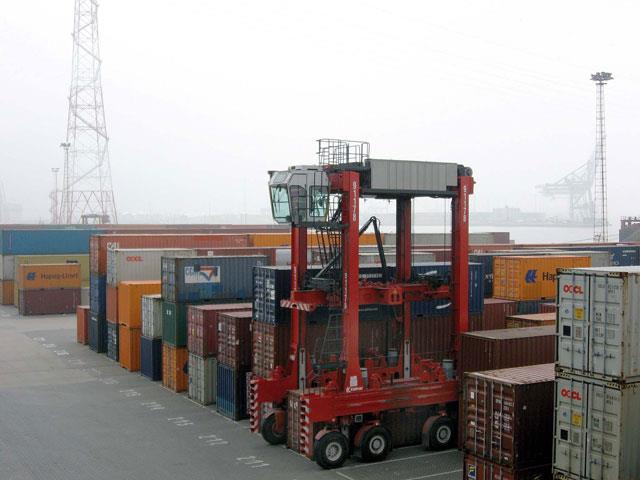 The new Pro Future hybrid technology package is a modular option that can be fitted to its seventh generation Kalmar ESC W straddle carrier. |
Kalmar Industries has introduced what it claims is the world's first straddle carrier with a hybrid drive system.
The new Pro Future hybrid technology package is a modular option that can be fitted to its seventh generation Kalmar ESC W straddle carrier. Kalmar claims the technology saves 25-30% in fuel.
Ikka Annala, Kalmar's straddle carrier vice president, says the straddle carrier's cyclical operations in container terminals is the reason for hybrid technology's good results in this particular application.
"This type of operation is very transient and has suitable positive and negative energy peaks that can be used to save fuel," Annala says.
"On an annual level, over 50 tonnes of carbon dioxide emissions per straddle carrier can be eliminated while employing hybrid technology," he adds.
The technology allows hoist motors to be used as generators when lowering containers. The energy produced can be stored. Energy produced from the electric drive system when machines are braking or decelerating is also stored.
The machine's super-capacitor energy storage system draws on the saved energy before making demands on the diesel engine for movement or lifting. An in-cab display shows the machine's energy flow, enabling fine-tuning of driving style for efficient operation.
The Pro Future package includes a super-capacitor energy storage system and a VSG (variable speed generator) diesel-generator package with temperature-controlled fan technology. The VSG system determines whether high or low engine power is needed to optimise engine use.
Kalmar is a leading supplier of cargo handling equipment to ports, terminals and intermodal facilities. It claims every fourth container or trailer transfer at terminals worldwide is handled by a Kalmar machine. With plants in Sweden, Finland, the Netherlands, Malaysia, China and the US, the company's net sales for 2007 totalled EUR1.343 billion (USD2.084 billion).